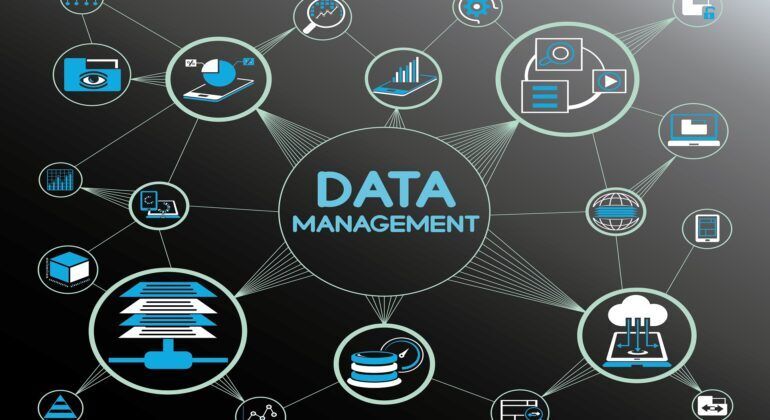Why Data Management For Small Businesses Is Very Crucial

It is not unusual for many business owners to lose track of their data as they are busy making products and selling them. You’d have sold so many products to many different users. You’d have also made so many profits and losses over the years in your business. That’s a lot of data. That is primarily why you need data management for small businesses.
Small businesses typically spend a lot of time delivering products or services and managing finances. Therefore, they usually forget about data, which is the essential aspect.
What Is Data Management?
Data management is the method of collecting, storing, and using data securely, effectively, and economically. It aims to help people and businesses to optimize the use of data within the bounds of policy and regulation to make critical decisions and take actions that maximize the gain to the organization. A solid data management strategy is becoming more critical than ever as companies increasingly rely on intangible assets to create value.
The data management process involves a mixture of different functions that ensure that the data in business systems are secure, available, and accessible. Most of the necessary work is done by data management and IT teams. However, business users also participate in few parts of the process to make sure that the data meets their needs.
Importance Of Data Management For Small Businesses
Data is frequently seen as a business asset that can make more informed business decisions, optimize business operations, reduce costs to increase profits, and better marketing campaigns. But a shortage of proper data management can burden organizations with inconsistent data pits and data quality issues that restrict their ability to run business intelligence and analytics applications.
Data management has also increased in importance. Most small businesses are subjected to heightened regulatory compliance requirements, including data privacy and protection laws such as GDPR. In addition, businesses are capturing enormous volumes of data and a wider variety of data types. Without reliable data management , such environments can become cumbersome and hard to navigate.
Who Is A Data Manager And What Does He Do
Data managers are professionals trained in data management. They help improve and govern data-oriented systems. These systems intend to meet a company’s needs and make decision-making more efficient.
Below are the functions of a data management consulting service:
- Cultivating awareness about data and its value across the entire organization.
- Encouraging the adoption of valuable and practical data-related guidelines, standards, and processes.
- Reducing all types of unnecessary efforts.
- Developing the best practices and implementing them.
Skills Of Data Manager or Data management Service Provider
1. Analyze Data Efficiently
Looking at important, unorganized data and analyzing it is an integral part of data management. It includes looking at various reports and lists, recognizing patterns, and analyzing the results. The data manager should also create presentations and make this data readable for other people in the team without any difficulty. Ability to use information effectively and improve various programs after the analysis is an efficient skill they must possess.
2. Navigate Database Softwares And Tools
There are many software and online tools that assist with data management. As a data manager or a data management service provider, one should navigate these tools and use them effectively for the organization’s benefit.
3. Files And Account Management
One of the many essential skills of a data manager is to track all the online files and accounts efficiently. They help other people keep track of their IDs, passwords, accounts, and additional details. They should be able to create different files and folders on a network and a computer.
4. Understanding and helping small businesses
Data management for small businesses is a great skill. A small business requires unique expertise in building effective plans and implementing various techniques. A skilled data management team should tackle a small business just as wisely as a large-scale organization. Our team at Oamii technologies is skilled at providing unique and superior data management consulting to small businesses.
5. Designing And Planning A Database
The database management team should be able to understand the design concepts and should come up with design plans instantly. They should be able to understand the different benefits and limitations of various database types. Engaging in both short and long-term plans concerning database projects is a must.
What Is The Goal Of Data Management
The ultimate goal of data management is to assist small and large businesses, organizations, and individuals in collecting various forms of data and use them for practical purposes. It helps business owners improve their company’s efficiency and make decisions based on relevant and valuable information. Data management prevents businesses from making assumptions and risking their money. It intends to give the user more specific details to take every step with calculated risk and a suitable plan.
Data Management Best Practices For Small Businesses
A properly planned data governance program is an essential component of an effective data management strategy, especially in distributed data environments that include various systems. A steady focus on data quality is mandatory. All the users and executives must ensure their data needs are met, and data quality issues aren’t preserved.
The multitude of databases and various other data platforms that are ready to be deployed requires a thorough approach when designing a data architecture and assessing and selecting technologies. IT and data managers must ensure that the systems they implement fit the designated purpose and deliver the data processing abilities and analytical information required by an organization’s business operations.
In Conclusion
Data management isn’t a complicated concept. It’s pretty easy, and if you’re recording and tracking your profits and losses digitally or physically, you’re already doing it. A well-executed data management strategy can help businesses gain potential competitive advantages over their rivals by developing operational effectiveness and allowing better decision-making. If you need help or professional advice concerning data management services, then contact us today. Our team will respond within 24 hours.
Disclaimer: The information on this website and blog is for general informational purposes only and is not professional advice. We make no guarantees of accuracy or completeness. We disclaim all liability for errors, omissions, or reliance on this content. Always consult a qualified professional for specific guidance.






